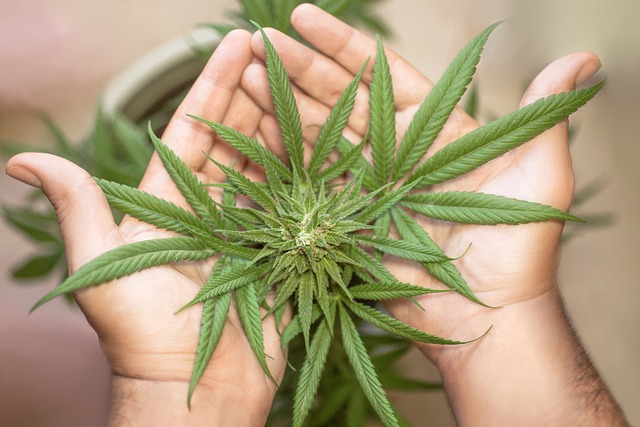2023 has seen THCA (Tetrahydrocannabinolic Acid), a non-psychoactive cannabinoid found in raw cannabis and legal in Delaware, emerge as a significant focus of medical and wellness research due to its therapeutic potential. Unlike THC, THCA offers the health benefits of cannabinoids without inducing intoxication, making it an alternative for those seeking relief from various conditions. In Delaware, where both recreational and medicinal cannabis are legal, researchers are exploring THCA's anti-inflammatory, neuroprotective, and analgesic properties, which have caught the attention of consumers and scientists interested in its health implications. The state's progressive stance on cannabinoids has established a fertile ground for investigating THCA's role in therapeutic contexts, potentially paving the way for new applications of cannabinoids in healthcare. As legal frameworks evolve, THCA's status as a legal substance in Delaware positions it as a key area of study with significant possibilities for its use in medications targeting various health issues.
Explore the intricate world of cannabinoids with an in-depth look at THCA flower, a raw cannabis form offering unique therapeutic and recreational potential. This article delves into its chemical composition, the nuanced differences between THCA and Delta-9 THC, and its legal status in Delaware, particularly under current THCA legal guidelines. Discover how this natural compound fits within the entourage effect, the importance of proper cultivation, and its growing presence in medical and recreational markets. We’ll guide you through the decarboxylation process that transforms THCA into its psychoactive form, and explore the therapeutic benefits of consuming raw cannabis. Additionally, learn how to safely use THCA flower, understand the role of terpenes, navigate appropriate dosage, and store your THCA flower effectively. As research continues to evolve, stay ahead with insights into the future of this burgeoning cannabis derivative in Delaware and beyond.
- THCA Flower: Unveiling the Potential of Raw Cannabis
- The Chemistry Behind THCA: What It Is and Why It Matters
THCA Flower: Unveiling the Potential of Raw Cannabis

THCA, or Tetrahydrocannabinolic Acid, is a non-psychoactive cannabinoid found in raw cannabis that has garnered significant attention within the medical and wellness communities. As of the knowledge cutoff in early 2023, THCA’s legal status in Delaware allows for its exploration and utilization in various applications. Unlike its psychoactive counterpart, THC, THCA presents a unique set of therapeutic potentials that are currently under investigation. Raw cannabis flowers rich in THCA offer a promising avenue for those seeking the purported health benefits of cannabinoids without the psychoactive effects associated with heated cannabis products. The interest in THCA has led to increased research into its properties, which suggest it may offer anti-inflammatory, neuroprotective, and analgesic effects. This burgeoning interest has spurred a growing number of consumers and researchers to explore the raw cannabis flower’s potential, with Delaware being one of the states where such exploration is legally permissible. As the legal landscape continues to evolve, the potential of THCA in Delaware and beyond remains an exciting frontier for those interested in the therapeutic applications of cannabinoids.
The Chemistry Behind THCA: What It Is and Why It Matters

Delta-9-tetrahydrocannabinolic acid (THCA) is a natural cannabinoid found in the Cannabis sativa plant, which exists abundantly in raw cannabis and degrades into THC upon heating or combustion. Its legal status in Delaware aligns with broader state regulations that allow for the recreational and medicinal use of cannabis products, provided they comply with the Delaware State laws governing such substances. The chemistry behind THCA is a fascinating aspect of cannabinoid research, as it is the precursor to THC, the psychoactive component most commonly associated with cannabis’s effects. Understanding THCA’s role is crucial for both scientific and legal contexts.
Scientifically, THCA has garnered attention due to its potential therapeutic properties, which include anti-inflammatory, antibacterial, and neuroprotective benefits. Research suggests that THCA interacts with the body’s endocannabinoid system by binding to the CB1 and CB2 receptors, though less potently than THC. This interaction may influence various physiological processes without the psychoactive effects associated with its decarboxylated form. The implications of this chemistry are significant, as they could lead to the development of THCA-based medications for a variety of conditions. In the context of legal standing, such as in Delaware where THCA’s legal status is aligned with that of THC, the distinction between these two compounds becomes an important consideration for producers and consumers alike, influencing product formulation and consumption methods.
cannabinoids like THCA have garnered significant attention within the scientific community and among consumers, particularly with the recent clarification on THCA flower’s legal status in states like Delaware. This comprehensive exploration into the potential of raw cannabis has shed light on the unique properties of THCA, a non-psychoactive precursor to THC. Understanding its chemistry and implications offers insights into broader applications for health and wellness. As research continues to evolve, it’s clear that THCA holds promise, and its legal standing in regions like Delaware will undoubtedly influence both scientific inquiry and market trends. The discourse on THCA’s potential is set to expand, reflecting a growing interest in the diverse offerings of cannabis beyond just its psychoactive components.
